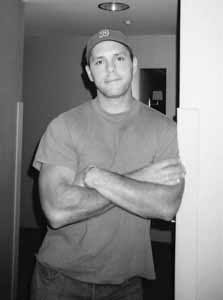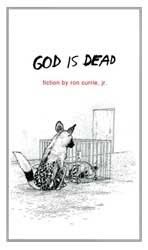
Young Lion Ron Currie, Jr.
Photo courtesy of Mr. Currie
Listen: When Ron Currie, Jr. awoke from troubled dreams one morning, he found that he had been transformed in his bed into an award-winning author.
Sort of. Ron’s transformation actually happened on the evening of April 30, 2008, when he was presented with the 2008 New York Public Library’s Young Lions Award in recognition of his debut novel, God is Dead (2007, Viking). The story is a believable account of mankind’s reaction to a devastating supernatural event (spoiler alert: God dies). At 33, Currie has already been compared to Kafka and Vonnegut.
Despite his increasing popularity, the gifted novelist remains down-to-earth and approachable; maintaining his own MySpace page and chatting with fans about the mysteries of life, like what God tastes like.* This week Mr. Currie sat down with The Inept Owl for an interview about his book, writing, religion and other stuff…
TIE: In your book, God is Dead, God suffers various earthly maladies: famine, injury, sickness. He is swept up in warfare and dies in the Darfur desert following a Janjaweed attack. In essence, God doesn’t hold up in the real world. Are the details of God’s experience on Earth a reflection of your feelings as an atheist? You could have had God iced by, say, radioactive circus clowns conjured by Satan.
RCJ: I don’t know if it has much to do with my atheism. It could be looked at a couple of ways. First, it’s just another take on the scandal of the incarnation–God subjecting himself by choice to the frailties of the flesh. It’s not as though I’m the first person to kill God on paper; this is a tradition, obviously, that goes way back. But I will admit that, on those days when it seems possible to me that there is a God, I find myself very, very angry with Him. For a number of reasons, both macro and micro. And you can interpret that any way you like, vis-a-vis the horrors He’s subjected to in the book.
TIE: When you’re working with a premise that could allow for anything, in this case the literal death of God, how do you keep yourself from going overboard? Is there a point where you say to yourself, “All right… This right here could never happen”?
RCJ: That’s pretty much the only sort of premise I work with these days, and I just sort of ride it however far it wants to go. Whether or not I’ve gone too far is subjective as hell, of course, and varies reader to reader. Some people’s threshold for suspension of disbelief is just greater than others’. Which isn’t to say I don’t have an obligation, as a writer, to do my best to maintain believability within the parameters of the world I’ve created.
TIE: While you were working on God is Dead, what sort of response did you think the book was most likely to receive? How did those expectations compare with what actually happened; the widespread praise with which the title has been met?
RCJ: I didn’t think about responses while I was writing the book, because I didn’t think it would ever be published. Once I had a contract and realized that, yes, people were actually going to read this thing, I wondered if anyone would get their knickers in a twist over it, and if they have, I’ve not heard from or about them. Many people of faith have gotten in touch and told me they loved the book, though. Initially I was surprised by this, but in retrospect it makes perfect sense (especially given my own background, steeped as heavily in Catholicism as it is) that these people saw in the book an affirmation of their faith, rather than a denunciation.
I should mention, too, that the title is sort of deceiving in that it seems to imply that the book is a sendup of God, or the Church, when in fact it’s much more firmly rooted in social satire. I’m frustrated by, and thus motivated to poke fun at, people of all cultures and creeds. We’re all a bunch of idiots, regardless of what we do with our Sundays (or Saturdays, or Fridays, depending).
TIE: Generally speaking, how do publishers’ concerns about/reactions to literature differ from those of the reading public? How is writing for a publisher different from writing for the public?
RCJ: I wouldn’t know, because the only productive way to write is for oneself. When I first learned Viking was going to publish GiD I went through a three-month period when I started to wonder for the first time what I “should” be writing next, instead of just following my nose like I’d always done in the past. It was like those little mind-control bugs from Star Trek: The Wrath of Khan (and if you have no idea what I’m talking about then just know that I was kind of screwed in the head, there, for a few months, and couldn’t write worth a shit). Slowly, though, I started to realize that the only way I’d ever write anything worth reading was to go with whatever amused and inspired me, just like always. When you start sniffing the air, you’re dead meat artistically.
TIE: What’s next for God is Dead? What’s next for Ron Currie, Jr.?
RCJ: Next for GiD is the paperback release, on the 28th of May. Next for me is finishing edits on my new novel–in it the world is destroyed, twice, a nine-year-old becomes a cocaine addict (and later the greatest baseball player of all time), and a triple-amputee blows up a federal building with a wheelchair full of high explosives. Plus it’s pretty funny. At least I think it is.
TIE: Tell the truth: Do you still pray to Saint Anthony when you misplace the remote?
RCJ: St. Jude, actually. I’ve got his medal around my neck as we type, and I think of him as not only the patron saint of lost causes, but just lost shit in general–car keys, flash drives, socks, and yes, television remotes.
* ”Unsalted Pringles”
Author’s Note: The Inept Owl would like to thank Ron Currie, Jr. for his generosity, which made this article possible. To learn more about Ron and his work, visit his website at roncurriejr.net or his MySpace page at myspace.com/roncurriejr. If you don’t get the Pringles thing, ask a Catholic.

If God can’t make it out of this novel alive, what hope does mankind have?
Read our review of God is Dead here.
